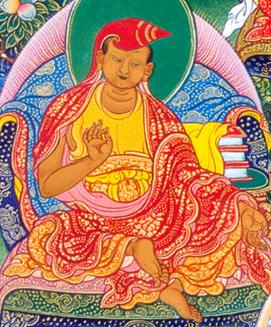Svatantrika Madhyamika: Difference between revisions
mNo edit summary |
No edit summary |
||
| Line 1: | Line 1: | ||
[[Image:Bhavaviveka.JPG|frame|[[Bhavaviveka]]]] | [[Image:Bhavaviveka.JPG|frame|[[Bhavaviveka]]]] | ||
'''Svatantrika''' (Skt. ''Svātantrika''; Tib. [[རང་རྒྱུད་པ་]], [[Wyl.]] ''rang rgyud pa''), 'Autonomous Syllogism' — a subschool of [[Madhyamika]] inaugurated by [[Bhavaviveka]] in his commentary upon [[Nagarjuna]]'s ''[[Root Verses of the Wisdom of the Middle Way]]''. | '''Svatantrika''' (Skt. ''Svātantrika''; Tib. [[རང་རྒྱུད་པ་]], [[Wyl.]] ''rang rgyud pa''), 'Autonomous Syllogism' — a subschool of [[Madhyamika]] inaugurated by [[Bhavaviveka]] in his commentary upon [[Nagarjuna]]'s ''[[Root Verses of the Wisdom of the Middle Way]]''. In the [[Nyingma]] tradition of [[Mipham Rinpoche]], the Svatantrika are defined as "those who first emphasize the wisdom that distinguishes the two levels of truth during post-meditation, and having temporarily established the [[categorized absolute]] involving assertions, gradually engage with the ultimate, uncategorized absolute that is free from all assertions"<ref>''dang por rjes thob bden gnyis so sor 'byed pa'i shes rab rtsal du bton nas gnas skabs rnam grangs pa'i don dam bden pa khas len dang bcas pa gtan la phab nas mthar thug rnam grangs min pa'i don dam bden pa khas len kun dang bral la rim gyis 'jug pa".</ref> | ||
==Tenets== | ==Tenets== | ||
| Line 11: | Line 11: | ||
In addition, [[Bhavaviveka]] is said to belong to the '''Sautrantika Svantantrika''', Shrigupta to the tradition of the '''Svatantrika of distinct appearance and emptiness''', [[Jñanagarbha]], [[Shantarakshita]] and [[Kamalashila]] to the tradition of the '''Yogachara Svatantrika''', and Acharya [[Sagaramegha]] to the tradition of '''Svatantrika of Logical Illusion'''. | In addition, [[Bhavaviveka]] is said to belong to the '''Sautrantika Svantantrika''', Shrigupta to the tradition of the '''Svatantrika of distinct appearance and emptiness''', [[Jñanagarbha]], [[Shantarakshita]] and [[Kamalashila]] to the tradition of the '''Yogachara Svatantrika''', and Acharya [[Sagaramegha]] to the tradition of '''Svatantrika of Logical Illusion'''. | ||
==Notes== | |||
<small><references/></small> | |||
==Further Reading== | ==Further Reading== | ||
Revision as of 20:11, 3 April 2011

Svatantrika (Skt. Svātantrika; Tib. རང་རྒྱུད་པ་, Wyl. rang rgyud pa), 'Autonomous Syllogism' — a subschool of Madhyamika inaugurated by Bhavaviveka in his commentary upon Nagarjuna's Root Verses of the Wisdom of the Middle Way. In the Nyingma tradition of Mipham Rinpoche, the Svatantrika are defined as "those who first emphasize the wisdom that distinguishes the two levels of truth during post-meditation, and having temporarily established the categorized absolute involving assertions, gradually engage with the ultimate, uncategorized absolute that is free from all assertions"[1]
Tenets
According to the Svatantrikas, there are two kinds of relative truth: the correct and the incorrect. Correct relative truth refers to phenomena that are undeceiving in terms of their characteristics, i.e. able to perform their particular function. For example, fire, which is hot and burning. The incorrect relative includes phenomena which appear yet do not function as they appear, such as the moon’s reflection or a drawing of a lamp.
The Svatantrikas divide the absolute truth into the conceptual and non-conceptual.
Subschools
The Svatantrikas are divided into early and later: Acharya Shrigupta belongs to the earlier; Jñanagarbha, Shantarakshita and Kamalashila, the so-called ‘Three Eastern Khenpos’ belong to the later.
In addition, Bhavaviveka is said to belong to the Sautrantika Svantantrika, Shrigupta to the tradition of the Svatantrika of distinct appearance and emptiness, Jñanagarbha, Shantarakshita and Kamalashila to the tradition of the Yogachara Svatantrika, and Acharya Sagaramegha to the tradition of Svatantrika of Logical Illusion.
Notes
- ↑ dang por rjes thob bden gnyis so sor 'byed pa'i shes rab rtsal du bton nas gnas skabs rnam grangs pa'i don dam bden pa khas len dang bcas pa gtan la phab nas mthar thug rnam grangs min pa'i don dam bden pa khas len kun dang bral la rim gyis 'jug pa".
Further Reading
- The Svatantrika-Prasangika Distinction—what difference does a difference make?, edited by Georges B.J. Dreyfus and Sara L. McClintock (Boston: Wisdom Publications, 2005).